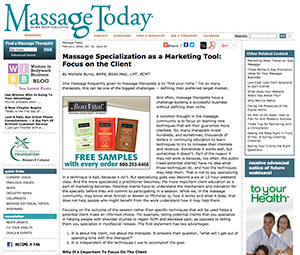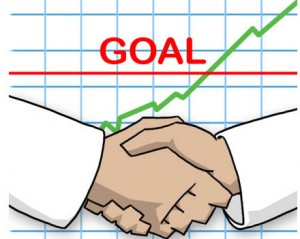 Teaching business for massage therapists and taking advanced and continuing education classes for many years, I have noticed that it is much harder to create a class based around a specific population or body area, as many massage therapists only want to learn new techniques. I wrote an article for Massage Today, Massage Specialization as a Marketing Tool: Focus on the Client. If you don't receive this free publication, I suggest going to their website and signing up.
Teaching business for massage therapists and taking advanced and continuing education classes for many years, I have noticed that it is much harder to create a class based around a specific population or body area, as many massage therapists only want to learn new techniques. I wrote an article for Massage Today, Massage Specialization as a Marketing Tool: Focus on the Client. If you don't receive this free publication, I suggest going to their website and signing up.
 Here is some of the information I recently shared in my August newsletter. Each newsletter has a specific focus. This month is focused on business and ethics information. If you would be interested in receiving my newsletters, please head over to my contact page and sign up.
Here is some of the information I recently shared in my August newsletter. Each newsletter has a specific focus. This month is focused on business and ethics information. If you would be interested in receiving my newsletters, please head over to my contact page and sign up.
Tidbits, Updates and Fun Facts:
The Ethics of Touch: The Hands-on Practitioner's Guide to Creating a Professional, Safe and Enduring Practice Second Edition by Cherie M. Sohnen-Moe and Ben E. Benjamin PhD.
Marketing Tips:
Ethics:
Research:
Career Spotlight:
Social media is a powerful tool for marketing our business, but it isn't the best or only tool. And, like any tool, it is most effective when used correctly. Too often, therapists get caught up in the myth of social media being a quick and easy answer for marketing without understanding the basics of using the tool effectively.Frequently, marketing is seen as "selling," so many businesses and therapists using social media, such as Twitter, Facebook and even LinkedIn, spend most of their posting time promoting their business--announcing specials, appointment availability, sharing new services or practitioners- rather than building a relationship with their followers or fans. While this information can be helpful, it begins to sound and feel like a carnival barker or the stereotypical "used car salesman." It manifests a poor job of identifying the customer/client's needs and addressing those needs.
Frequently, marketing is seen as "selling," so many businesses and therapists using social media, such as Twitter, Facebook and even LinkedIn, spend most of their posting time promoting their business--announcing specials, appointment availability, sharing new services or practitioners- rather than building a relationship with their followers or fans. While this information can be helpful, it begins to sound and feel like a carnival barker or the stereotypical "used car salesman." It manifests a poor job of identifying the customer/client's needs and addressing those needs.
Just like in any interaction with customers or potential customers, people are looking for ways to get their needs met. A business or practitioner that clearly identifies the needs of a potential client and then offers ways to address those needs, more easily engages the interest of the client. This highlights the importance of identifying the practitioner's target market. Once the "who are we serving?" question is answered, it becomes much easier to identify the clients needs and how to best meet them. The focus, then, of interactions becomes addressing the clients needs--education, suggestions, research--rather than the business' needs--filling open appointments, making payroll, etc.
In fact, most marketing professionals suggest an 80% focus on building the relationship through information and education, and a 20% focus on promotional and business material. Once you identify your target market and identify their needs, consistent presentation of information that helps the client understand how you can best meet those needs, allows you and your business to develop a reputation as the best source for meeting their needs.
Having been a massage therapist for many years with a large and successful practice, I am now faced with the job of sharing the tools that led to that success with students and I sometimes find it challenging to put into words what I knew intuitively. When I found the article “Building Your Authority and Credibility by Stephanie Beck in the October 2013 issue of Massage Today, I was intrigued, as it immediately resonated with many of my business practices and philosophies.
So many massage therapists practicing complain about they are having trouble getting new clients. They take more classes, add more letters and certifications after their name, and don’t understand why people aren’t flocking to sign up for sessions. The question in many massage therapist’s minds seem to be “Don’t all these techniques and certifications make me an authority?” and, as Stephanie points out in her article, no, not in the client’s mind.
So, what does constitute authority to clients? According to Stephanie, and my own experience, the thing most clients are looking for is someone who knows what they need and can help them find the best solution to their problems. It is the therapist who knows who their client is and what can best serve them. It is the therapist who is an advocate and an educator, not the therapist that is trying to sell them on a service or a technique. It is the therapist that can engage the interest of the client by listening and problem solving, by providing information and by addressing the concerns of the client.
Stephanie points out clients or prospective clients usually have 4 questions they want answered:
Too many massage practitioners are more focused on what they know (techniques, skills, anatomy) than on what information will answer the client’s questions and needs. It isn’t enough to just list or recite your training to show how qualified you are as a therapist, because that doesn’t really answer the client’s question. What is effective is to discuss your solution for the problem and provide proof of the effectiveness of that solution, whether that is testimonials or studies or success stories from other therapists. The key is to let the client know that you can help them and how, and that others have been helped the same way. This is what establishes authority and credibility in their eyes.
Building authority provides a built in referral market to build your practice. It is a process and takes practice, but pays big dividends in creating a successful business. I know it was one of the best tools that helped me and I am grateful to Stephanie for putting into words what I knew intuitively.